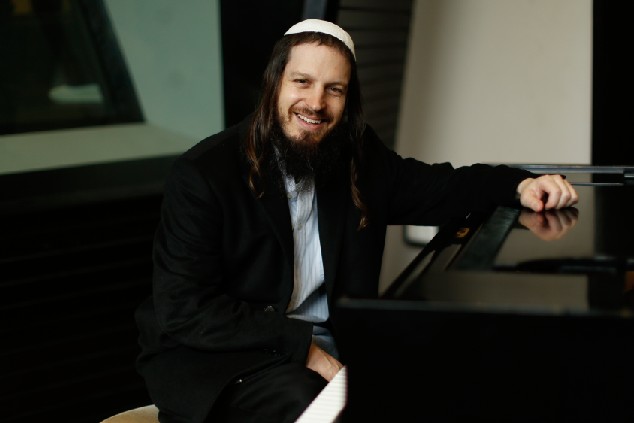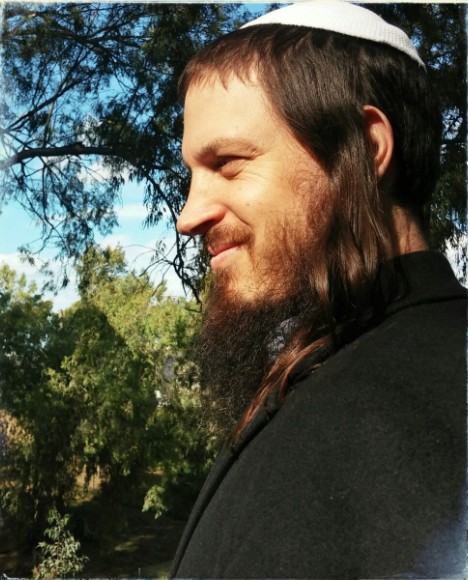Music Between Kindness and Judgment: Gadi Feingold's Musical Transformation
Gadi Feingold, owner of Pluto Studios, thought his musical career was behind him, but two years ago he reignited his passion for composing, writing, and singing. In the latest chapter of his musical journey, he reflects on the significant shift in his approach to music both then and now.

Gadi Feingold's first musical crisis occurred when he was 11. From the age of seven, he learned to play the piano in a classical style. His mother enrolled him in lessons because of his developed musical sense, recognizing that he clearly loved music more than anything else. "We lived in the United States, and I would sit in front of MTV all day," he recalls.
However, at 11, he stopped playing. "In hindsight, I realized the method I learned wasn't right for me. It was very rigid, structured, demanding things like playing scales. Classical music didn't suit me. I didn't feel it allowed me to express my creativity." Nevertheless, he continued to love music, listened to every instrument in the compositions he heard, and dreamed of a career as a world-renowned singer, musician, composer, or arranger.
When did you start playing again?
"At 15, I discovered rock 'n' roll, the possibility of playing without being tied to notes, to improvise. Rock 'n' roll is much more open and creative, emphasizing your individual personality. I returned to playing the piano and started learning guitar."
At 16, Feingold formed his first band. After his military service, he gathered the original group of friends into a more professional band named 'The Jiggles' that frequently performed in Tel Aviv. "We released a record, we had big dreams," he recalls. But the dreams quickly shattered. "That was my second crisis with music. I had to realize that there was no connection between my fantasies and reality, that in this country we had no chance to be like The Beatles, attracting a hundred thousand people to a concert. And when that dream was crushed, I understood I was making music to get attention and love."
That's true, presumably, for many artists.
"Definitely, but with me, Hashem did a special kindness – I didn't succeed in making music in that way."
At 23, the band dissolved, and Feingold tried to find an alternative path in life instead of the musical creator's life he had dreamed of since childhood. "I told myself: it's time to grow up, be more practical. I went to study at 'Rimon,' started playing a bit with other artists, and opened my studio. I couldn't completely abandon music, but I became a 'music service provider.' It was more of a business and less of a dream. As a studio manager, I dealt mainly with logistics, negotiations, and other aspects of running an independent business. I was involved in music like a restaurant owner deals with food..."
 (Photo: Kobi Wolf)
(Photo: Kobi Wolf)As his studio was taking its first steps, two significant changes occurred in Gadi Feingold's life: he got married and began drawing closer to Judaism. "It was a process, of course. I started learning the 'Yemima' method, trying to observe Shabbat. My wife was also heading in the same direction. After we married, we attended many classes in Tel Aviv by Rabbi Erez Moshe Doron and Rabbi Yehoshua Shapira, and gradually, we drew closer and closer. Seven years ago, we found our community, 'Nahora' in Ramat Gan, which takes a Hasidic approach. Until then, I thought I had a problem because I couldn't study Talmud and Jewish law and only studied Hasidism – suddenly I discovered there are rabbis I can learn Talmud and Jewish law from too... I just needed to find the right teachers."
Drawing closer to Judaism created the third shift in his life concerning his music. "As a child, I had a crisis because classical music didn't suit me. As a young man, I had to contend with the shattering of my unrealistic dreams. After becoming religious, music simply moved aside. I discovered that the joy in Torah study replaced my need for music, and for years I truly didn't feel the need to return to it."
 (Photo: Netanel Frumansky)
(Photo: Netanel Frumansky)Two years ago, however, Gadi began to feel the draw to music awakening within him again. "I felt that I must return to creation, this time in a corrected and proper way as much as I can. I returned to writing and composing, this time from a completely different place. It takes me a lot of time to clarify for myself what my message is, what I want to say, whether it really fits.
"As a studio owner, I work with quite a few artists who have drawn closer to Judaism, and they all talk about this endless search, this constant clarification to make sure we're doing what's right, that we're constantly clarifying things with ourselves."
It sounds like quite a process.
"It is. Sometimes it seems there's something to envy in artists who wake up in the morning and make music as they please, without answering to anyone. But it's not true. As a child, I rebelled against classical music because it was very much in the realm of 'judgment' with all its strict rules. But music without any boundaries is not something I want either. I've been there, and it didn’t lead me to good places. We know that artists who live this way are usually far from true happiness. When you live unrestrained lives – everything is meaningless. The music I'm trying to make is music that has both judgment but also kindness... as the Torah teaches us."

